Call Monday-Friday 9am - 6pm Closed Saturday & Sunday



[ Contact Us ]
Need Help? Calling from a mobile please call 0151 647 7556
0800 195 4926Do you have a question? or need help?
Call Monday-Friday 9am - 6pm Closed Saturday & Sunday,

It's one of the few big financial decisions you make in your life. You have to be smartly realistic when it comes to buying a car. It is not just about monthly payments.
Our information below would be a good start on how to get the next vehicle. Find out how do you pay for a car with a budget, but you can't quite imagine how you do it.
Car finance is a convenient way of funding a new car purchase. There are different types of financing, including Personal Contract Hire, Personal Contract Plan, Hire Purchase and Personal Loan. We will take each one in turn. We will also discuss the pro's and con's of each method so you have a better idea of which type may suit you best.
This is the closest thing in the car world to a 'lease'. You pay a fixed monthly figure for your new car, which includes your insurance and breakdown cover. This type of contract typically lasts between 2-4 years, although you can end the agreement early by paying the early termination charge.
The advantage of PCH is that you don't worry about depreciation, and you have the surety of a fixed term. You know when the term is up, and so you can plan your new lease in plenty of time.
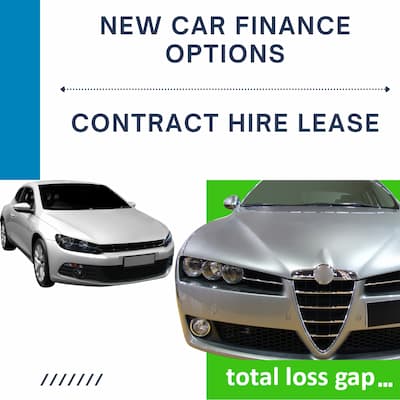 If you treat your new car well, PCH is an excellent way to go. You should be able to get favourable contract hire deals with any number of independent brokers or direct with the main dealer.
If you treat your new car well, PCH is an excellent way to go. You should be able to get favourable contract hire deals with any number of independent brokers or direct with the main dealer.
Contract Hire style leases differ from other finance styles because it is a rental agreement with no option to own the vehicle included. This is fine as long as you are aware of this and can afford the rental.
PCH deals typically feature a fixed monthly rental over a set term. You may also have an advanced rental payment to make upfront, and this of often based on a multiple of the monthly rental. As there is no option to purchase, there is no end payment or balloon payment to pay.
Having no option to buy the vehicle means you hand the car back at the end of the deal. The leasing company may offer you the chance to buy the car, but this is not written into the agreement. If you purchase it at the end of the contract, this is a separate transaction or arrangement.
At the end of the PCH agreement, the vehicle is usually inspected. You may find that if the car's condition is worse than you would expect for fair wear and tear, additional 'hand back' charges are payable.
Personal Contract Purchase (PCP) is often confused with PCH as they are so similar in name. In truth, however, PCP Plans are more in common with Hire Purchase agreements.
Personal Contract Purchase deals are structured with a fixed upfront deposit for the car. You then pay in monthly repayments for a fixed term, which is typically 2-4 years. 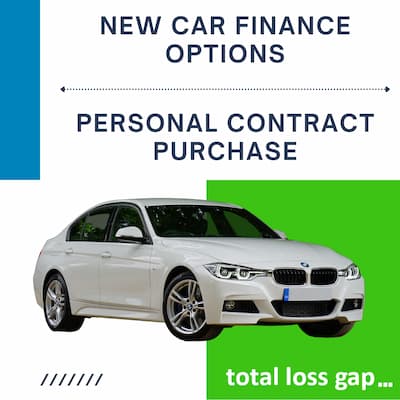
You have three options at the end of your PCP deal:
Buy the car for the Guaranteed Minimum Future Value (or Guaranteed Future Value GFV). This is a fixed sum stated in the original agreement. In doing this, you own the car outright.
Trade the car in with a motor dealer. If the vehicle is worth more than the GMFV, then this effectively becomes your deposit towards the new car.
Hand the car back to the finance company with nothing more to pay. You may do this if the vehicle is not worth the GMFV, and therefore you have no deposit or equity left in it to use.
If you take the final option and return the car, please be aware that you can face hand back charges for damages deemed outside normal wear and tear or where you have exceeded the mileage limits of your PCP agreement.
The difference with PCP, compared to PCH, is that during the contract period, you have an option to trade-in for a new car if your circumstances change. This is because you can own the vehicle, and therefore you have the right to change early.
PCP deals may require a deposit payment at the start of the agreement, and then you will pay fixed repayments over a set term. Finally, you will have a final balloon payment final payment to make at the end of the period if you want to own the vehicle. This is the Guaranteed Future Value.
PCP is much more like a Hire Purchase agreement than a PCH agreement. PCP is effectively a Hire Purchase agreement with a deferred payment at the end.
Like Hire Purchase, you can own the vehicle, interest is included in the payments, and you have the same termination and repossession rights you get with Hire Purchase.
The best means is usually to obtain your financing from the dealership where you're buying it. So before getting started, it is best to ask online brokers first. You can get a copy of the best offer too to ask them to match or beat it. The cheapest quotation can be taken to the dealer, so you compare it with the deal.
You may also like
Motor manufacturers often subsidise interest rates on PCP finance deals to attract customers. However, you can also find that the monthly instalments are low because the car has been discounted, and the interest rate is not very competitive.
You should be aware that the interest you are paying on a PCP is on the whole outstanding balance on your loan. This includes the GFV balloon payment that you do not pay until the end of the deal.
If your vehicle has been heavily discounted, but the interest rates on the deal are pretty high, remember you can arrange alternative funding and pay off the PCP early if you wish.
Hire purchase agreements are standard on new and used vehicles. You can generally take HP agreements between 1 and 5 years, and payments are subject to interest being added (except 0% APR HP agreements).
If you take an HP agreement, it is very similar to PCH as you can own the vehicle by paying off the finance.
Hire Purchase agreements can also be known as Conditional Sales.
The main difference between HP and PCH is that when the agreement ends and you have made all the payments, you own the vehicle.
Like PCP, you have termination and repossession rights if you fall into difficulties with your payments.
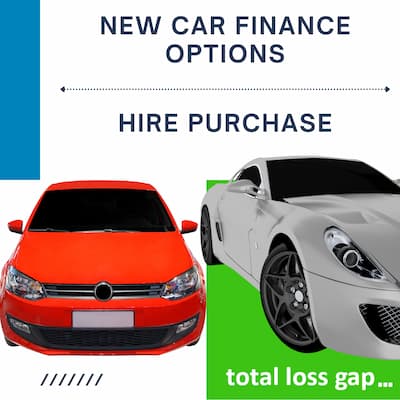 Where can you get Hire Purchase deals?
Where can you get Hire Purchase deals?
The supplying motor dealer will have several finance companies they can offer deals from typically. However, you can find any number of independent finance brokers who can also offer Hire Purchase deals. Often they will pass the customer on finance first and then pay the dealer before they release the car.
Hire purchase is a good idea for people who can only afford lower monthly instalments for longer periods so as not to have to pay much more in the long run. It is better value than PCP if you can afford it.
Hire purchase is more generally available on used vehicles. It is rare to be able to get a PCH on a used car; PCP is possible. However, if you are looking for the lowest possible monthly payments over the most extended term, a 5-year agreement is generally only available on Hire Purchase.
If you have a Hire Purchase or PCP agreement, the good news is that you also have repossession and termination rights if something goes wrong with your deal.
You have the right to hand back the vehicle to the finance company if you have paid half the total amount payable on the finance agreement.
Why would you do this? Well, if you have paid the required amount, you no longer want to keep the car, AND the vehicle is not worth what you still owe on it, then you can hand the car back and walk away.
This should not impact your credit rating, as it is a legal right you have. However, you should be aware that if the vehicle's condition is worse than just normal 'wear and tear, the finance company can charge you to refurbish the car.
This means that once you have paid a third of the total amount payable on the agreement, the finance company cannot repossess the vehicle without a court order should you fall behind on payments.
The termination and repossession rights on HP and PCP are sometimes known as 'halves and thirds' for obvious reasons.
A loan from a bank, also known as a Personal Loan, is an alternative way to buy a car. The bank will loan you a fixed amount, and then you will pay fixed payments over a set term. This term is usually between 1 and 5 years, although some banks have provided bank loans, for higher amounts, for up to 7 years.
If you borrow large amounts of money and over a more extended period, then the interest rate you pay is quite essential. With personal loans, particularly for people with a good credit score, the interest rates can be very low.
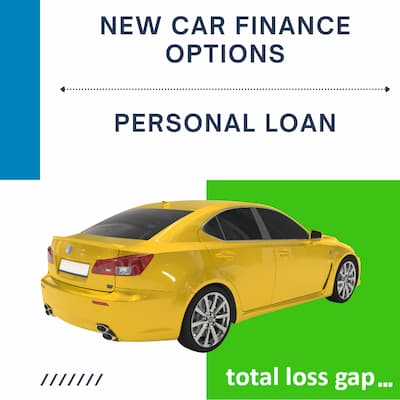 Where to get the best Personal Loan deals
Where to get the best Personal Loan deals
The first place to get a quote for a personal loan is from the bank you already use for your everyday accounts. They will know you better than most and will be able to make a suitable offer.
You are not just tied to your bank, however. Many of the larger banks run their personal loans online so that you can get a quote from several different lenders.
You may find that if you require a loan over £25,000, the number of banks that provide this in the UK can be restricted. However, even if your bank does not, then you can always check others in the market.
If your bank does make you an offer for a personal loan, it is always best to compare this with other offers you get. Often your bank may have a 'matching' service to if you do get a better offer, they will match it to keep your business.
The main difference between this type of agreement and PCP or HP is that the loan is linked to you and not the vehicle, like with PCP or HP. This means you own the car from day 1; you do not have to wait until the agreement is paid off.
Owning the vehicle from day one does provide you with some advantages of flexibility. For example, you can change the vehicle without having to pay off the loan. You can get a new car and keep on paying your fixed monthly payments.
If circumstances dictate, you can even sell the vehicle and use the cash for something else.
Often you get the very best deals on a new car when you use the manufacturers PCP or HP deal. You may get a Deposit Allowance that the manufacturer pays towards your PCP, for example.
You can also find that if you take a personal loan through your bank, should you need further borrowing later, they may not be able to provide this if you have an outstanding loan with them. This is because the other borrowing could take you over the maximum borrowing limit the bank may have for you.
One method of paying for a new car that is often overlooked is using a credit card. There are reasons why using a credit card can be a good idea. However, there are also reasons why it may not be advisable.
Many credit card providers may offer you deals on purchases. These may allow you low or 0% interest over a fixed period. If this is the case, then paying the balance off over the offers fixed term can be a cheap way of funding your car.
However, if your credit card provider does not have an offer for purchases, you may find that you are paying a much higher interest rate than you could on PCP, HP or a Personal Loan.
Similarly, even if you have a purchase offer but do not pay off the total balance in time, you may switch to the standard interest rate; again, this can be expensive.
In that circumstance, you can look at another credit card provider who may offer a balance transfer offer, and you can move the outstanding amount across.
Always check the fees, interest rates and other qualifying criteria before thinking of using this method to buy a new car.
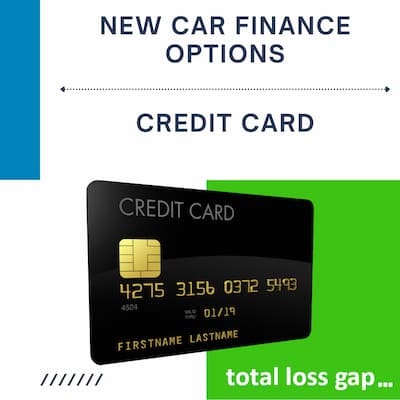 Extra potential protection you may get through buying a car with a credit card.
Extra potential protection you may get through buying a car with a credit card.
Suppose any item you purchase on a credit card is more than £100 and lower than £30,000 you're covered under section 75 of the Consumer Credit Act. Buying a car by credit card will protect your purchases for free. It means you may get a refund if things go wrong.
However, you will need to clear with the dealer that they accept credit cards as a method of payment. These days the dealers cannot pass on the processing fees charged for taking credit card payments. It may be ok for you to pay a deposit on a credit card but not the whole amount.
Having considered all the different ways of financing a car, which is the best way to do it?
In truth, there are plenty of considerations in making that decision. The temptation is looking at the cheapest way, but that might not be the best way.
There has been a recent trend in seeing private individuals securing new cars by contract hire lease agreements. They often provide the lowest overall costs over a comparable term against other forms of financing. But this may not be the full picture that you need to consider.
The downsides of taking a new car on a lease may include:
You are committed to having the vehicle for the duration of the lease.
You cannot own the vehicle.
Non-ownership leases tend to suit people who are happy having the vehicle for a fixed term, and they know they have to change the car at the end.
You may also like
Finance agreements linked to the vehicle, like HP or PCP, can be good options for many people. They can allow the flexibility of ownership and often reduce costs at the end of the term if you have been responsible with the vehicle.
HP or PCP Leasing arrangements are generally considered to be better value than personal credit finance, as a percentage of overall cost over the period, primarily where the manufacturer has provided a financial incentive for taking their finance. Still, there is also an element of flexibility, which may be a critical factor in your decision.
Personal Loans can be an excellent option for low-interest rates and maximum flexibility. Remember, you own the vehicle from the start, and even if you sell it, you do not need to pay off the loan. You can get a new car and keep on paying the loan.
The downside of a personal loan can include you not getting the best financial deal on the new car. Often you have to take the manufacturers finance package to get all allowances and discounts.
You may also find that your loan provider may limit or deny further borrowing whilst you have a current loan with them. If you are looking to borrow cash for a new kitchen, you may need to look to another lender.
Buying a new car via a credit card can be difficult. Even if your motor dealer agrees to this method of payment, your credit card provider may only have a limited time for you to repay the balance, even if it is 0% APR. This means unless you can pay back larger monthly repayments, you may need to find another credit card provider who can offer you a balance transfer deal.
The best way to finance a new car purchase is not an easy decision. But the right financing can help you get into your dream vehicle with little stress and anxiety. Whether you're looking for PCP, PCH, HP or personal loans, there are many options available that will fit your specific needs.
Above, we have discussed how these types of finance work in detail so that you know what to expect from them before making any decisions about which one might be the best option for you!